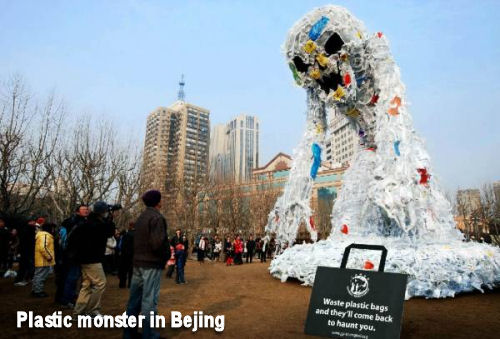Plastic no longer a great future
 In 1967 when the film The Graduate was released, plastic had entered our world and in fact it had been lurking around in various forms for about a century. By the 1950s, children’s toys, lunch boxes and drink bottles packed for school lunches were made of plastic. Would modern children even recognise a world without plastic?
In 1967 when the film The Graduate was released, plastic had entered our world and in fact it had been lurking around in various forms for about a century. By the 1950s, children’s toys, lunch boxes and drink bottles packed for school lunches were made of plastic. Would modern children even recognise a world without plastic?
When I was in year 2 at school, in 1956 a fellow pupil’s father worked in “Plastics” and this child brought to school a tantalizing array of plastic swatches in pink, green black, dark and pale blue, shiny on one side and matt on the other which she distributed to her friends and which we used as book marks. I did not know what they were for but I did know that I liked them. They could have been for chair coverings or any other use as a substitute for leather. The seats of the new car my father bought in 1955 were made of a variation of this plastic. In the 1950s and 1960s our radio was made of some sort of plastic as was my transistor radio which I got for Christmas in about 1962. Commercially made soft drink bottles were made of glass as were milk bottles. The dairy Australia website reveals that milk cartons were first introduced in 1958 in Australia, the first blow- moulded plastic bottle appeared in 1970 and by 1987 only 2% of milk sales were in glass bottles. Our family in the 1950s ordered 3 pints of milk per day and the washed glass bottles were left outside the front door where they would be replaced with full bottles sealed with a pliable metal top. In the same period we used to cover our school books with transparent sheets of plastic to protect them .First of all with polythene and then with a clearer more attractive plastic that allowed the covers of our books to shine through with the cloudiness of the polythene we had used up til then.

Plastic was beginning to permeate our lives even back in the 1950s but it gathered momentum and must have been a really emerging field in business in the late 1960s as shown in that wonderful exchange between Benjamin and Mr. McGuire in the film The Graduate.
Mr. McGuire: I just want to say one word to you. Just one word.
Benjamin: Yes, sir.
Mr. McGuire: Are you listening?
Benjamin: Yes, I am.
Mr. McGuire: Plastics.
Benjamin: Exactly how do you mean?
Mr. McGuire: There’s a great future in plastics ..think about it
Benjamin: Yes I will.
Mr. McGuire: Enough said. That’s a deal
In the age of abundant oil the manufacturing and retail giants have adapted and profited from the convenient storage medium of plastic. Now, its not so easy to return to the days of home deliveries and glass bottles. The centralised economy of supermarkets, warehouses and long-distance transport has too much influence. And the mums of the 1950s no longer exist, except in super-rich households. The mums are going to work, and the family is ever-more dependent on the plastic bag society.
Plastic is wonderful stuff. Mainly because it is so….”plastic” It comes in all sorts of bright colours, as containers it can enhance a product, it makes durable and easy to apply paint for houses and for artists Acrylic paints for artists have their own qualities which actually define the work produced as much as do oil paints.
But over the last few decades it looks as though humans have tragically and monumentally overdone the use of plastic.
It has come to light in the last few days not as a surprise but as a horrible reality that the ever rising number of plastic users, globally and the persistent nature of plastic as well as careless disposal mean that 269 thousand tonnes of plastic now have accumulated in the world's oceans. This waste is killing marine life , through strangulation or being ingested.. Many of the pieces are small and enter OUR food chain having been eaten by fish that humans then eat.
The accumulations tend to be in huge island like masses drawn together by circular currents. The prediction is that these accumulations will increase.
Once again humans have over done it.
Plastic is made from the following – coal, natural gas, minerals , plants and crude oil. https://www.youtube.com/watch?v=6eCt0VDg-Kc These are all natural substances but in the wrong place and in chemical combinations that make them very stable and therefore persistent they become polluting rubbish.
http://en.wikipedia.org/wiki/Persistent_organic_pollutant
In the interests of long term sustainability they really shouldn’t be used to make things that we want to dispose of! The accumulations of plastic substances in the oceans are a clear message that the Earth as a rubbish bin is not large enough to absorb 20th and 21st century waste.
I don’t know what “Benjamin” did with his life and as he is a fictional character this is only an idle speculation, but back in 1967, his dawning adult life and those of all the other Baby Boomer Benjamins must have loomed so importantly before them, yet now all our lives are being dwarfed by the waste we collectively leave behind.

Recent comments